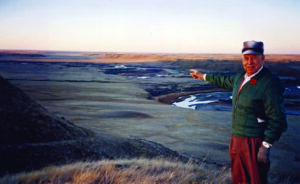Miywasin Moment: Preserving history in the Hills
By JoLynn Parenteau on April 27, 2022.
Royce Pettyjohn's late grandfather Willard A. Dumont gestures toward Milk River, where he worked as a cowboy for the Spencer Brothers outfit, in this undated family photo.--PHOTO PRINTED WITH PERMISSION
Every day, Royce Pettyjohn goes to work following his ancestors’ footsteps.
As park manager for the Cypress Hills Interprovincial Park on the Saskatchewan side, Pettyjohn cares for the homelands of his Dumont Métis forefathers.
Born in the Cypress Hills like generations which came before him, Pettyjohn was raised in a ranching family in Merryflat, Sask., south of Fort Walsh. It wasn’t until a school history lesson on the Métis Northwest Resistance and the 1885 Battle of Batoche that Pettyjohn would learn of Resistance leader Louis Riel’s military commander, renowned Métis hunter and tactician Gabriel Dumont. Discovering his maternal family legacy in his youth in history class was the beginning of a lifelong journey of historical discovery and preservation for Pettyjohn.
The Cypress Hills, 2,500 square kilometres of protected wilderness, were once home to many Métis. Families lived on homesteads in nearly every coulee and made their living hunting, trapping and fishing on forested lands rich in resources. Large families shared small log cabins, and hard work was a way of life.
In 1883, settlers and ranchers began to displace the Métis from the Cypress Hills. In 1906, the Dominion Forest Reserves Act was passed, creating the Cypress Hills Federal Forest Reserve. While the federal government’s landmark conservation effort protected the forest, the majority of the remaining families it sheltered were pushed south to Montana or north to the Battleford region.
Pettyjohn’s great-great-grandfather Henry Dumont (1860-1933) chose not to move too far. His cabin and barn were taken down log by log and hauled in the wagon just over the forest preserve boundary line and rebuilt. Henry’s family of five lived in the resurrected single room cabin. Generations on, Pettyjohn’s aunts Gladys and Mary, a schoolteacher for settler children, lived in the cabin until the early 1960s.
In the early days of the newly-protected forestland, Henry’s son William (Pettyjohn’s great-grandfather) worked as a labourer, tending tree plantations and building the first roads, while Henry and other Métis were contracted to collect pine cones for seeds, providing crucial work in the growth of new forestland. William set traplines for furs in the cold months when animals’ coats were thickest, an important source of income for the holidays. Furs were bundled into the wagon, carted into Maple Creek to sell to Bortnick’s, in order to buy Christmas dinner and small gifts to tuck inside children’s wool socks.
The next generation saw change and challenge. William’s son Willard (Pettyjohn’s grandfather) left home at the age of 13 to work on the Q Ranch as a sheep herder. The Second World War took him overseas where he rose to the rank of Sergeant. Upon his return to Canada, Willard Dumont and many other Métis were shut out of work in cities, a legacy of discrimination dating back to the Red River Resistance (1869-70). It was a return to ranching that allowed Willard to provide for his family, which included daughter Debra, Royce Pettyjohn’s mother.
Working to protect his ancestral homelands in the Cypress Hills and sharing Métis history is a dual vocation for Pettyjohn. In February of this year, Pettyjohn joined the South West District for Culture, Recreation and Sport on Zoom as a guest speaker for Indigenous Storytelling Month to share his family’s hardy legacy of perseverance through strife.
Through listening to his late Grandfather Willard’s storytelling, and Pettyjohn’s own work at Fort Walsh National Historic Site, Pettyjohn gleaned much about Métis sport and recreation in the Cypress Hills in the late 19th and early 20th centuries. Pettyjohn now shares his knowledge with the public on how living heritage continues on in the form of pow wows, rodeo, The Hills are Alive Métis Festival and Maple Creek’s annual hockey showdown between Nekaneet First Nation and local cowboys, a friendly fundraiser known as Battle of The Little Big Puck.
The Cypress Hills were home to generations of trailblazing Dumonts. May they rest knowing Pettyjohn remains to preserve their history and care for his ancestors’ forested homeland, where the pines touch the prairie sky.
JoLynn Parenteau is a Métis writer out of Miywasin Friendship Centre. Column feedback can be sent to
jolynn.parenteau@gmail.com
13
-12
 Royce Pettyjohn's late grandfather Willard A. Dumont gestures toward Milk River, where he worked as a cowboy for the Spencer Brothers outfit, in this undated family photo.--PHOTO PRINTED WITH PERMISSION
Royce Pettyjohn's late grandfather Willard A. Dumont gestures toward Milk River, where he worked as a cowboy for the Spencer Brothers outfit, in this undated family photo.--PHOTO PRINTED WITH PERMISSION

